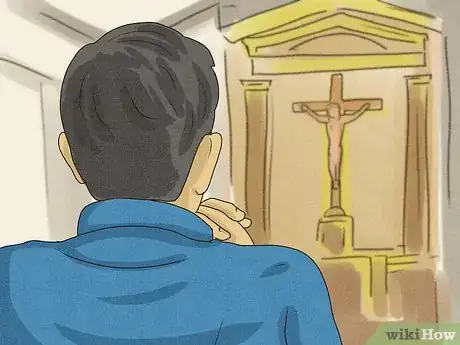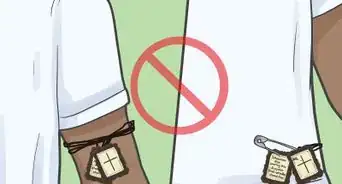This article was co-authored by wikiHow staff writer, Luke Smith, MFA. Luke Smith is a wikiHow Staff Writer. He's worked for literary agents, publishing houses, and with many authors, and his writing has been featured in a number of literary magazines. Now, Luke writes for the content team at wikiHow and hopes to help readers expand both their skillsets and the bounds of their curiosity. Luke earned his MFA from the University of Montana.
wikiHow marks an article as reader-approved once it receives enough positive feedback. This article received 13 testimonials and 100% of readers who voted found it helpful, earning it our reader-approved status.
This article has been viewed 345,654 times.
Learn more...
Confession can be a little intimidating, but it’s worth it to receive God’s grace and forgiveness. Remember that the priest is there to help, not judge, and that there’s no reason to feel afraid or ashamed. Whether you’re a long-time Catholic who’s gone a bit too long without visiting the confessional or are receiving the sacrament for the first time, we’ll guide you through what you need to do before, during, and after your confession in order to receive forgiveness. Let’s get that weight off your shoulders.
Things You Should Know
- Visit your church during a designated confession time or call your priest to schedule a private confession.
- Examine your conscience and make a note of any sins you can remember, and which you’ll confess to the priest
- Begin your confession with, "Bless me, Father, for I have sinned. It has been [this long] since my last confession,” then explain your sins to the priest.
- Listen to the priest’s counsel and assigned penance, then say the Act of Contrition. After, complete your penance as soon as possible.
Steps
Before Confession
-
1Find a confession session at your local church. Most churches hold designated times for confession. Call or visit your local parish’s website to find the schedule, or call you priest to schedule a private session.[1]
- Many churches announce confession times on a sign outside the church or as part of the church bulletin, which can almost always be found at the entrances. Some are even up online!
- Private sessions are a good idea if you have a lot to talk about. A normal confession may last about 5-10 minutes. If you think yours will last a lot longer, feel free to ask for a private session.
-
2Examine your conscience and identify your sins. An examination of conscience is a mental review of your wrongdoings that you perform before confession. Think back on any sins that you’ve committed since your last confession, and make a mental note of them, or write them down so that you don’t forget them when you enter the confessional.[2]
- Many people choose to make an examination of conscience by reviewing the 10 commandments, or by reviewing some of these questions:[3]
- Have I disobeyed any of the commandments?
- Have I nourished my faith?
- Has anything else in my life influenced me more than God?
- Have I denied or doubted my faith?
- Have I hurt others, either accidentally or purposefully?
- Have I rejected any part of my faith?
- Have I been forgiving?
- What are the causes of my sins? What temptations do I surround myself with?
Advertisement - Many people choose to make an examination of conscience by reviewing the 10 commandments, or by reviewing some of these questions:[3]
-
3Pray and ask God for grace and an honest confession. Before you enter the confessional, take a moment to collect yourself and place yourself in a state of grace. It's always a good idea to say a little prayer before confession to ensure that all goes well, nothing escapes your memory, and to ensure that your penitence is meaningful and true. You want to go in with nothing but the best of intentions.
- Remember that the most important part of confession is your honesty and earnestness. Even if you forget to confess some sins, what matters is that you’re seeking forgiveness.
- Also keep in mind that the priest has vowed to keep your confession a secret, and to keep it even under threat of death! You don’t have to be afraid to admit to your wrongdoings; it stays between you, the priest, and God.
During Confession
-
1Enter the confessional and begin your confession. When the priest is ready, take your place in the confessional—someone else will exit the confessional, or the priest will motion you in). Sit down either across from him or behind the screen—it's totally up to you whether or not you prefer to remain anonymous. The priest will begin with the sign of the cross, and then you say:[4]
- "Bless me, Father, for I have sinned. It has been [however many weeks, months, or years] since my last confession."
- Sometimes the priest will then make some conversation about your faith or your personal life. This is an opportunity to relax and make yourself comfortable before you dive into confessing your sins.
-
2Confess your sins. You can be as specific or as general as you like, but make sure you’re being honest and not avoiding the matter. Err on the brief side—there’s no need to give a full recount of every sin. That said, take your time, and focus on forgiveness and grace, rather than any shame you might feel while explaining your sins.[5]
- For example, a brief confession of a sin might be something like, “I was unkind to my coworker a few weeks ago,” or, “I gossiped about my sister to my friend.”
- Take special care to confess your mortal sins. If you’re not sure if a sin is venial or mortal, or if you’re having trouble grappling with your sins, ask your priest for counsel. No matter what you confess, he’s there to listen and be understanding.
- When you’re finished, say something like, “These are all the sins I can remember,” or, “I ask forgiveness for these sins,” to signal to the priest that you’ve finished.
-
3Say your Act of Contrition after the priest assigns your penance. The priest will talk to you a bit about your sins and may ask about your intentions. Then, he’ll give you penance—an act of prayer you’ll fulfill in order to be fully forgiven. Listen intently and make a note of what you’ve been told to do. The priest will then ask you to make an Act of Contrition. Recite:[6]
- ”My God, I am sorry for my sins with all my heart.
In choosing to do wrong and failing to do good,
I have sinned against You whom I should love
above all things. I firmly intend, with your help,
to do penance, to sin no more, and
to avoid whatever leads me to sin.
Our Savior Jesus Christ suffered and died for us.
In his name, my God, have mercy.” - Don’t worry if you forget the prayer; the priest will help you recite it.
- Penance often comes in the form of saying a certain number of prayers or doing charitable acts.
- ”My God, I am sorry for my sins with all my heart.
-
4Listen as the priest offers absolution, then take your leave. After you say your Act of Contrition, the priest will offer the Prayer of Absolution. Listen closely and do your best to absorb and appreciate the words. When he’s finished, say “Amen.” The priest will then say, “Give thanks to the Lord for he is good.” Respond with, “His mercy endures forever,” thank the priest, and exit the confessional.[7]
- ”Absolution" means your sins are washed away. "Penance" is your expression of regret and repentance, showing God that you're truly sorry for what you've done and that you wish for nothing more than to be forgiven.
After Confession
-
1Spend some time in the church and reflect on your confession. Take a moment to offer a prayer to God, thanking him for forgiveness. This is a great time to unwind if you find that confessing your sins made you a bit anxious—that’s a natural reaction! Relax and revel in your restored grace, and contemplate on how you plan to avoid sin in the future.[8]
-
2Complete your penance. Whatever the priest suggested you do for penance is best completed as soon as possible. Whether that's while you linger in the Church or later by asking for forgiveness from a loved one, seek to fulfill your commitment to penance as soon as you can.[9]
-
3Plan your next confession. Just because you’ve been forgiven for your sins, it doesn’t mean God expects you to never sin again. We’re only human, after all. But it’s important to keep going to confession to keep being forgiven and to foster your grace and spiritual connection to God. Try to go to confession once a week or so.[10]
- There’s no set schedule for how often you should confess. God will accept your confession and offer forgiveness even if you go years without confessing, but it’s best to confess more often than not.
Rosary Prayer
Community Q&A
-
QuestionWhat if a forget how to say the Act of Contrition because I am nervous?
 wikiHow Staff EditorThis answer was written by one of our trained team of researchers who validated it for accuracy and comprehensiveness.
wikiHow Staff EditorThis answer was written by one of our trained team of researchers who validated it for accuracy and comprehensiveness.
Staff Answer wikiHow Staff EditorStaff AnswerDon't worry! The priest will understand and help you recite the prayer. They've performed the sacrament many times, and know how nervous you might be.
wikiHow Staff EditorStaff AnswerDon't worry! The priest will understand and help you recite the prayer. They've performed the sacrament many times, and know how nervous you might be. -
QuestionIf you are not a Catholic , can you confess? And what and what will you say? Or is there a particular statement to recite?
 wikiHow Staff EditorThis answer was written by one of our trained team of researchers who validated it for accuracy and comprehensiveness.
wikiHow Staff EditorThis answer was written by one of our trained team of researchers who validated it for accuracy and comprehensiveness.
Staff Answer wikiHow Staff EditorStaff AnswerOnly baptized Catholics can take part in the sacrament, but you may be able to speak to a priest about your sins anyway. Call your local church and explain your situation, and see if they can schedule a less formal meeting.
wikiHow Staff EditorStaff AnswerOnly baptized Catholics can take part in the sacrament, but you may be able to speak to a priest about your sins anyway. Call your local church and explain your situation, and see if they can schedule a less formal meeting. -
QuestionDuring confession, do you recite the Act of Contrition by heart or read from a prayer book?
 Community AnswerIf you know it by heart, that's great, but if you need to read from a prayer book, that's totally okay. The only thing that matters is that you mean the words you are saying.
Community AnswerIf you know it by heart, that's great, but if you need to read from a prayer book, that's totally okay. The only thing that matters is that you mean the words you are saying.
Warnings
- Don’t intentionally leave out a mortal sin. If you choose not to mention it, then your confession will be invalid and you will not be forgiven.⧼thumbs_response⧽
Things You'll Need
- The Rosary or chaplet (optional)
References
- ↑ https://aleteia.org/2017/08/12/how-to-go-to-confession-when-you-havent-gone-in-years/
- ↑ http://olfparish.org/uploads/docs/stepbystepguidetoconfession.pdf
- ↑ https://www.beginningcatholic.com/catholic-examination-of-conscience
- ↑ http://www.ncregister.com/info/confession_guide_for_adults
- ↑ https://www.altoonacathedral.org/confession-step-by-step/
- ↑ https://www.usccb.org/resources/Bulletin-Insert-Penance-ENG.pdf
- ↑ https://www.usccb.org/resources/Bulletin-Insert-Penance-ENG.pdf
- ↑ https://aleteia.org/2017/08/12/how-to-go-to-confession-when-you-havent-gone-in-years/
- ↑ https://aleteia.org/2017/08/12/how-to-go-to-confession-when-you-havent-gone-in-years/
About This Article
When you go to confession, prepare by asking yourself if you have disobeyed any commandments, doubted your faith, or hurt others. Remember that the priest can’t disclose your secrets or pass judgement on you, so you can be totally honest with him. When you enter the confessional, make the sign of the cross as the priest prompts you to. You can remain anonymous if you wish, or identify yourself. Either way, the priest won’t treat you any differently. You should follow his lead in the conversation, but don’t worry about following a traditional format. Just think of confession is a casual conversation between you, the priest and God. For more tips on going to confession, like how to complete your penance and reflect on your session afterwards, keep reading!










































































